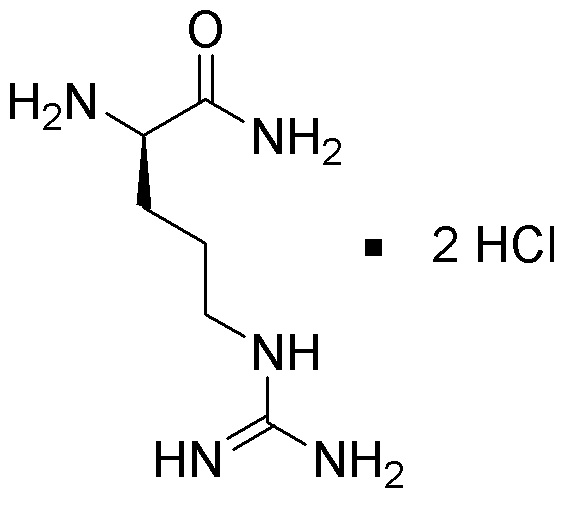D-Arginine amide dihydrochloride is widely utilized in research focused on:
- Pharmaceutical Development: This compound is often used in the synthesis of various pharmaceutical agents, particularly those targeting cardiovascular and metabolic disorders, due to its role in nitric oxide production.
- Biochemical Research: It serves as a substrate for studying enzyme activities, especially in the context of arginine metabolism, which is crucial for understanding various physiological processes.
- Cosmetic Formulations: The compound is incorporated into skincare products for its potential benefits in enhancing skin hydration and elasticity, making it popular in the beauty industry.
- Nutrition Supplements: It is used in dietary supplements aimed at improving athletic performance and recovery, leveraging its role in promoting blood flow and nutrient delivery to muscles.
- Cell Culture Applications: Researchers utilize it in cell culture media to support cell growth and function, particularly in studies involving immune cells and their responses.
General Information
Properties
Safety and Regulations
Applications
D-Arginine amide dihydrochloride is widely utilized in research focused on:
- Pharmaceutical Development: This compound is often used in the synthesis of various pharmaceutical agents, particularly those targeting cardiovascular and metabolic disorders, due to its role in nitric oxide production.
- Biochemical Research: It serves as a substrate for studying enzyme activities, especially in the context of arginine metabolism, which is crucial for understanding various physiological processes.
- Cosmetic Formulations: The compound is incorporated into skincare products for its potential benefits in enhancing skin hydration and elasticity, making it popular in the beauty industry.
- Nutrition Supplements: It is used in dietary supplements aimed at improving athletic performance and recovery, leveraging its role in promoting blood flow and nutrient delivery to muscles.
- Cell Culture Applications: Researchers utilize it in cell culture media to support cell growth and function, particularly in studies involving immune cells and their responses.
Documents
Safety Data Sheets (SDS)
The SDS provides comprehensive safety information on handling, storage, and disposal of the product.
Product Specification (PS)
The PS provides a comprehensive breakdown of the product’s properties, including chemical composition, physical state, purity, and storage requirements. It also details acceptable quality ranges and the product's intended applications.
Certificates of Analysis (COA)
Search for Certificates of Analysis (COA) by entering the products Lot Number. Lot and Batch Numbers can be found on a product’s label following the words ‘Lot’ or ‘Batch’.
Numéro de catalogue
Numéro de lot/série
Certificates Of Origin (COO)
This COO confirms the country where the product was manufactured, and also details the materials and components used in it and whether it is derived from natural, synthetic, or other specific sources. This certificate may be required for customs, trade, and regulatory compliance.
Numéro de catalogue
Numéro de lot/série
Safety Data Sheets (SDS)
The SDS provides comprehensive safety information on handling, storage, and disposal of the product.
DownloadProduct Specification (PS)
The PS provides a comprehensive breakdown of the product’s properties, including chemical composition, physical state, purity, and storage requirements. It also details acceptable quality ranges and the product's intended applications.
DownloadCertificates of Analysis (COA)
Search for Certificates of Analysis (COA) by entering the products Lot Number. Lot and Batch Numbers can be found on a product’s label following the words ‘Lot’ or ‘Batch’.
Numéro de catalogue
Numéro de lot/série
Certificates Of Origin (COO)
This COO confirms the country where the product was manufactured, and also details the materials and components used in it and whether it is derived from natural, synthetic, or other specific sources. This certificate may be required for customs, trade, and regulatory compliance.


